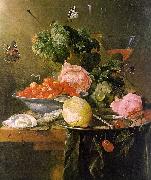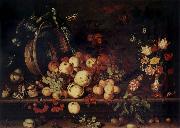
Oil On
Canvas, Real Flavor of Old Masters
|
Jan Dirksz Both
|
|||
|
|
|||
| Dutch 1610-1652 Jan Dirksz Both (between 1610 and 1618, Utrecht - Aug 9 1652, Utrecht), brother of Andries Both, was a Dutch painter. From 1634 to 1637 he was taught by Bloemaert and the painter Gerard van Honthorst before travelling to Rome ca. 1637. There he met the French painter Claude Lorrain, with whom he collaborated on a series of landscape paintings. His landscapes are typically peopled by peasants driving cattle or travellers gazing on Roman ruins in the light of the evening sun The everyday life of the streets of Rome became a favourite theme in his works. On his return to Utrecht after the death of his brother in 1642, he stopped producing genre pieces and focused instead on pictures of Italian landscapes bathed in a warm, golden light. This theme was adopted by several other Dutch painters, the Italianites. | |||
|
|
|||
|
|
Still Life with Fruit Jan Dirksz Both2.jpg Painting ID:: 1592 Visit European Gallery |
1652 Nardoni Galerie, Prague | |
Height Width |
INS/CM |
||
|
X |
|
||
|
|
|||
|
Nicolae Grigorescu
|
|||
|
|
|||
| Romanian Painter, 1838-1907 From 1848 he trained in Bucharest with various church painters, producing icons and religious mural decorations. These works, which soon attracted attention, were influenced in style by the Viennese classicism widespread in the Romanian principalities in the early 19th century and by the Italian academicism established there after 1850 by Gheorghe Tattarescu. The earliest of his known paintings are in the church of SS Constantin and Elena at Baicoi, where his signature can be seen beside that of Nita Pereescu on the icon of St George (1853). He subsequently painted a series of icons (1854-5) at Caldarusani Monastery. In the later ensembles he was assisted by his older brother Georghe Grigorescu, who participated under his direction in the decoration of churches, such as those of the Zamfira (1856-8) and Agapia (1858-60) monasteries. In Nicolae's paintings at Agapia, classicism in Romanian art reached its highest point. The royal icons are distinguished for the elegance of the figures, both in their attitudes and in their drapery. | |||
|
|
|||
|
|
Still Life with Fruit new4/Nicolae Grigorescu-346975.jpg Painting ID:: 30750 Visit European Gallery |
nn06 1869 oil on canvas glued on wood 38x71cm | |
Height Width |
INS/CM |
||
|
X |
|
||
|
|
|||
|
Jean Baptiste Oudry
|
|||
|
|
|||
| French Baroque Era Painter, 1686-1755 French painter. He was the principal animal painter and one of the foremost decorative painters during the first half of Louis XVs reign. After initial training as a portrait painter, he concentrated on still-lifes; by the 1720s he had also begun to establish himself as a specialist in hunting scenes, game-pieces and portraits of animals. He ran an active workshop, often keeping his best originals for years and selling copies and (more or less autograph) variants. In the 1730s he was most active as a tapestry designer, making numerous designs for the royal tapestry works of Beauvais and the Gobelins, and he continued to produce his brilliantly painted hunts, still-lifes and studies of animals and birds to the end of his career. | |||
|
|
|||
|
|
Still Life with Fruit new16/Jean Baptiste Oudry-326394.jpg Painting ID:: 40536 Visit European Gallery |
mk156 1721 Oil on canvas 74x92cm | |
Height Width |
INS/CM |
||
|
X |
|
||
|
|
|||
|
AST, Balthasar van der
|
|||
|
|
|||
| Dutch Baroque Era Painter, ca.1593-1656 1657). Dutch painter. He was the brother-in-law of Ambrosius Bosschaert (i), whose household he entered in 1609, after the death of his father. He remained as Bosschaert's pupil, until he was 21. In 1615 van der Ast moved with the Bosschaert family to Bergen-op-Zoom. However, a year later the Bosschaerts were living in Utrecht, but van der Ast is not recorded there until 1619, when he was entered as a master in the Guild of St Luke. He remained in Utrecht until 1632, then lived in Delft, where he enrolled in the painters' guild on 22 June 1632. On 26 February 1633 he married Margrieta Jans van Bueren in Delft, where he spent the rest of his career; the marriage produced two children. | |||
|
|
|||
|
|
Still life with Fruit new16/AST, Balthasar van der-667525.jpg Painting ID:: 41033 Visit European Gallery |
mk159 1620s Oil on panel 75x104cm | |
Height Width |
INS/CM |
||
|
X |
|
||
|
|
|||










